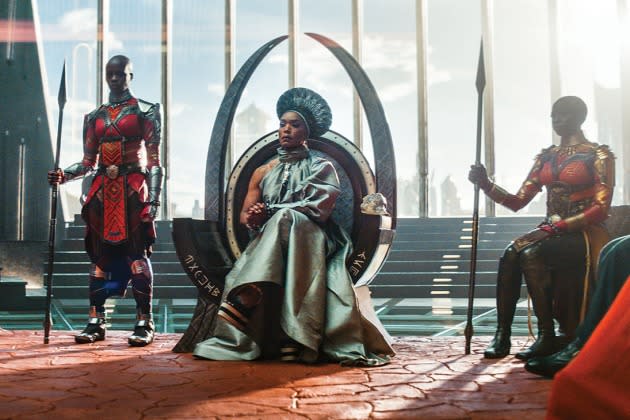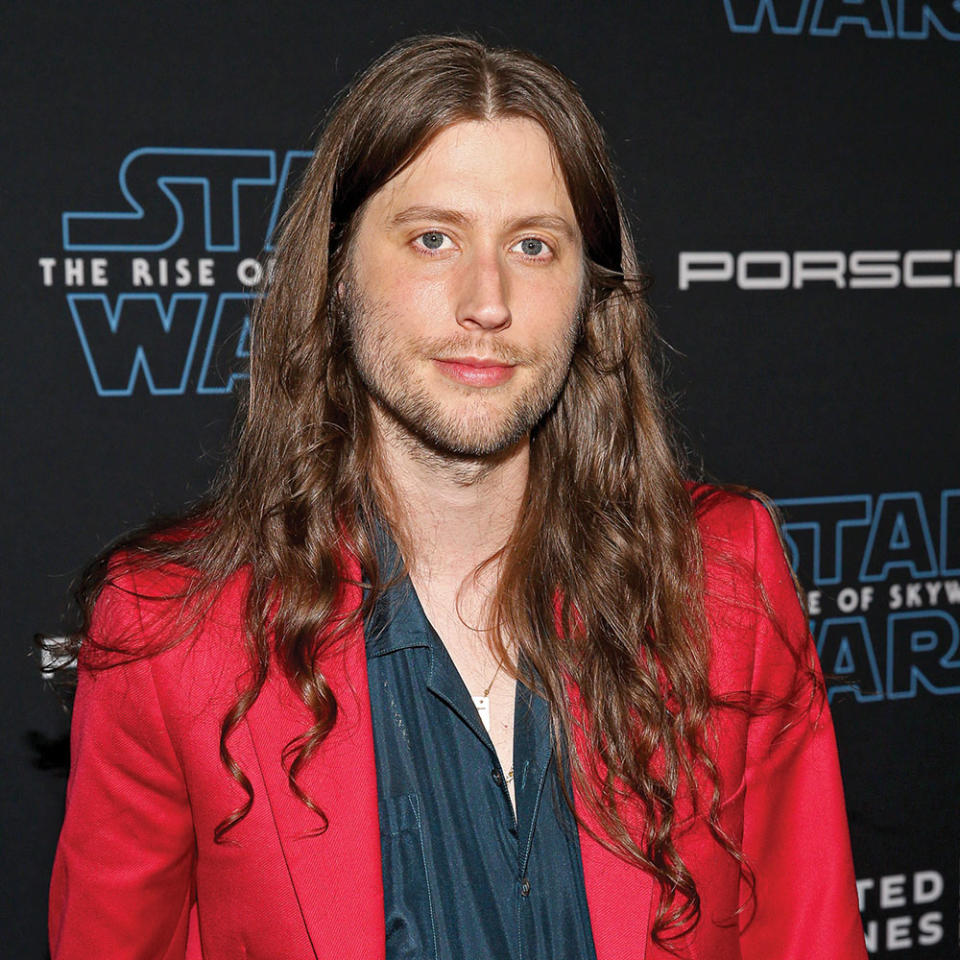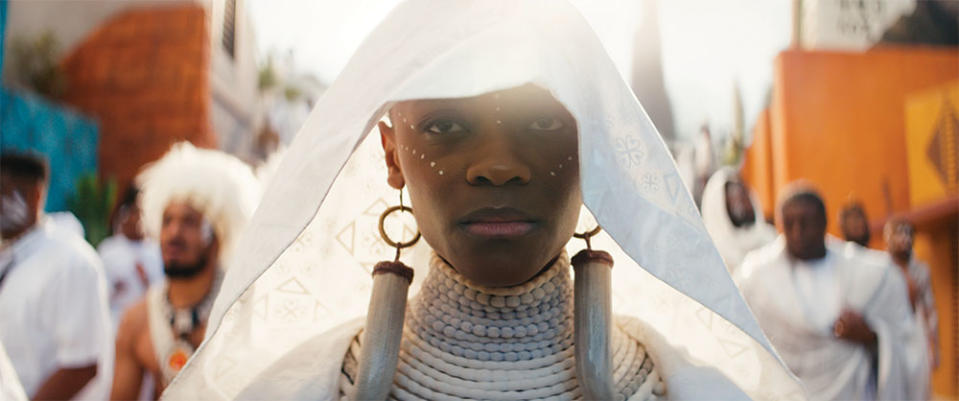‘Black Panther: Wakanda Forever’ Composer Ludwig Göransson on Working With Rihanna: “She Felt a Strong Connection With the Story”
- Oops!Something went wrong.Please try again later.
- Oops!Something went wrong.Please try again later.
- Oops!Something went wrong.Please try again later.
- Oops!Something went wrong.Please try again later.
- Oops!Something went wrong.Please try again later.

When Ludwig Göransson attends the 95th Academy Awards, he’ll be walking in as both an Oscar winner (he won for Black Panther in 2018) and a first-time nominee (for his first original song entry). He, alongside director Ryan Coogler, Nigerian artist Tems and global icon Rihanna, are nominated for “Lift Me Up” from Black Panther: Wakanda Forever.
For the in-demand composer — whose work has provided soundscapes for The Mandalorian (seasons one and two), Tenet, Creed I and II, Donald Glover’s Guava Island and more — his most recent collaboration with Coogler is the culmination of a 15-year partnership. But the Swede has said their work on Black Panther made him a better composer. “I’m very fortunate to be able to work with collaborators who choose to do art,” says Göransson. “With Wakanda Forever, Ryan really wanted to push the boundaries and field in music and sound and songs and how we can all combine those three elements. Everything you can hear in the movie, there’s so much thought and detail put into that.”
More from The Hollywood Reporter
'The Banshees of Inisherin' Composer Says He Approached the Film Like a Fable
'Guillermo Del Toro's Pinocchio' Wins Five Trophies Including the Top Prize at the 50th Annie Awards
NAACP Image Awards: Will Smith, Angela Bassett, 'Black Panther: Wakanda Forever' Among Top Winners
A few weeks before the Oscar ceremony on March 12, Göransson chatted with THR about convincing Rihanna to record the track, discovering Mayan music and compiling a massive wish list of collaborators.

Long before Rihanna’s Super Bowl performance, you were already in talks with the new mom to contribute to the Black Panther: Wakanda Forever soundtrack. How did you convince her?
Very early on, we started having conversations about music and we talked about the story, how can you relate that to artists, what’s the sound we are going for, what is the artist who would embody the story. And obviously, the movie being about motherhood — and then the movie also being full of very strong female characters — the name that we started talking about was Rihanna. But obviously, we knew she was about to be a mother and we knew that she hasn’t released any music in six years. The chances were pretty slim. But I have a good relationship with Roc Nation and also with Jay Brown, Rihanna’s manager. I reached out to him very early about it. He was honest and said this project would be of interest but also that she’s very busy. It wasn’t until she had her baby [that] she was able to see a rough cut of the movie. She felt a strong connection to the story and, after a conversation with Ryan, that was what I think brought her into the project.
When you’re scoring a film representing so many cultures and partnering with global artists, why is it important to record in the environments where the artists are from?
We’re trying to get as close to the truth as we can. With Ryan, we’re building worlds, and some of these worlds are very closely related to history — especially the Talokan and that world being related to the Mayans — and Wakanda being a fictional country in Africa that was not colonized and that has the most advanced intelligence and technology in the world. What’s the closest we can come to that in real life? I feel when you deal with music, and so much of musical identity in an artist is where they’re from, that’s why I think it’s just so important to be at a place where the artist feels the most comfortable with them or herself.
There was a challenge with incorporating Mesoamerican music because a lot of Mayan music has been erased. How did you know where to start?
It was all erased. The thing you can still find are traces of it in instruments. You can find traces of instruments in the graves. For the Mayan part, I was working with music archaeologists — who were essentially musicians, but they have a degree in archaeology. They’re able to access those grave sites. Normal archaeologists wouldn’t see something that looks just like a cane or something that looks like an ornament, but the musicologist can see that there are actually holes and fingerprints on these ornaments. They can see this is a musical instrument. Thanks to working with these music archaeologists and using these instruments that were actually used during the Mayan era, we were able to reimagine the sound that we think would be as close as possible to what it actually sounded like.
When you’re producing movie soundtracks and incorporating contemporary artists, do you search Spotify or Apple Music playlists first, or do you have a massive notes list in your phone of artists you want to work with?
That’s a great question. I definitely had an extensive playlist on Spotify and Apple Music before I went to Nigeria and before I went to Mexico, with 200, 300 songs. Some artists are pretty well established in Mexico, and some artists are not. Listening to their voices, looking at the lyrics, reading about them, reading about what they have to say, where they’re from, what their agenda is and thinking about how these voices would fit into Ryan’s story was definitely a big piece of the puzzle on this movie.
Tems is one of the hottest artists out of Nigeria right now. When did you start working together?
Tems’ entry point was right when I started writing music for the movie, which Ryan was still shooting. Ryan and I talked about how we could have a throughline of songs into the score and having it all be a part of the same DNA. My first trip was to Mexico and I started working on the sound for the Talokans, for Namor. And then right after, I took a trip to Nigeria. Ryan had finished shooting the film, so we were actually able to go together.
We made a dream list of people we wanted to work with in Nigeria. Tems was on the top of that list. We wanted to do her version of “No Woman, No Cry,” and we wanted her to sing on the trailer. After we recorded that, we presented her with the idea of “Lift Me Up.” We knew it was a special idea. I asked Ryan to write some lyrics beforehand, but it wasn’t until the session with Tems that he showed me the lyrics. We had this melody, and she just took it to another place by writing this incredible verse.

The talking drum was really significant for T’Challa in Black Panther, so what was the instrument or sound that was central in Wakanda Forever?
I would say the human voice. The talking drum is as close as we can get in a percussive instrument to sound like a human voice. With the talking drum, you’re speaking with it, you can say words, you can say syllables. It’s almost like it’s a voice by itself. For this movie, having the human voice — mostly driven by the female voice being the narrative of the music and the score, both songs and score — was very … I didn’t consciously make that decision, but it was something that when the movie was done and I was like, “Oh my God, there are voices throughout the music, almost two hours and 40 minutes of vocals and voices.”
When you’re in the womb, you hear your mother’s voice. When you’re born, the first thing you hear, your first sentences you have, are from your mother most of the time talking to you. And there’s something so intimate about that, I felt really connected with the story, especially when a lot of the story is about dealing with something very complicated and you can see the characters trying to express it, but a lot of the music is actually emoting what’s going on inside of their heads.
I spoke with Wakanda Forever production designer and your fellow Academy Award winner Hannah Beachler a couple of months ago, and I asked her about the majestic 900-page Wakandan bible she created. Do you ever use it as a reference for the music you create?
What’s special to be part of Ryan’s family is that he keeps me involved. Sometimes, I’m in meetings with Hannah, sometimes I’m talking to Ruth [Carter, costume designer], and we’re all part of the family. He doesn’t try to keep us separate. He’s including everyone in the process so we all feel like we’re working together. That’s one of the secret recipes of why his movies are so successful and so special.
Besides yourself, who among your fellow nominees are you rooting to win best original song?
It’s a great year. There are a lot of great songs, and I’m just happy to even be part of it.
Interview edited for length and clarity.
This story first appeared in a Feb. stand-alone issue of The Hollywood Reporter magazine. To receive the magazine, click here to subscribe.

